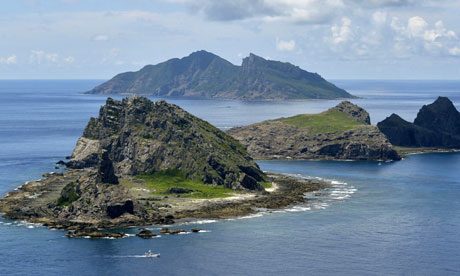
The Japanese-controlled Senkaku Islands, which China also claims as the Diaoyu (Huffington Post)
Last week, some 200 Chinese fishing boats were escorted by 13 coast guard vessels to the fishing waters just off Japanese-controlled islands claimed by both countries in the East China Sea. The islands, called the Senkaku in Japan and the Diaoyu in China, are uninhabited and represent a major potential flashpoint between Tokyo and Beijing.
The latest intrusion into Japanese waters by Chinese boats is part of a stepped-up affair following Japan’s purchase of the islands from a Japanese family in 2012. The government purchase inflamed Chinese nationalists, who staged large-scale protests and demonstrations in dozens of cities, while mobs smashed Japanese cars and looted Japanese-owned stores.
Tokyo sought to downplay the purchase, arguing the government needed to buy the islands before the outspoken nationalist governor of Tokyo, Shintaro Ishihara, could get his hands on them. Mr. Ishihara had gathered millions of dollars in donations with the intention to purchase and develop the islands on behalf of the metropolitan government.
The Chinese sailing comes less than one month after Beijing lost a ruling out of The Hague, brought by the Philippines and effectively debunking Chinese claims to the South China Sea. With all of the international attention now focused on a potential aggressive backlash by Beijing in the South China Sea, and against the Philippines, Beijing appears to have gone from slicing salami in the south to slicing sushi in the east.
Yet the sushi-slicing strategy may not go far, as Japan’s Prime Minister Shinzo Abe has successfully pushed domestic laws on collective self-defense through parliament, and has made major strides in contributing to security in the region through joint military exercises and the export of weapons. Abe will not easily back down—having previously inflamed Chinese opinion with his visits to the controversial Yasukuni Shrine to pay respect to Japan’s war dead (and leading WWII war criminals), and having been called by the Economist “a hawk with distorted views of history”.
Abe has warned China many times over the disputed Senkaku/Diaoyu islands, saying Japan would not concede “one millimeter” of territory. And Abe has been beefing up the military—should Beijing attempt to occupy any Japanese island, they may face a elite 680-strong brigade tasked with an assault on and recapture of the lost territory.
With the latest incursion by Chinese boats, Mr. Abe is clearly being tested by an angry Beijing, and will need to calm his nationalistic contingent while avoiding any missteps which might cause further escalation. After the recent ruling out of The Hague, Abe is now in a better position to assert sovereignty over the Senkaku and to harness the fear and anxiety of Vietnam and the Philippines to push forward greater joint military cooperation and exports.
As the strongest military nation among China’s neighbors, Abe should pursue a concerted effort among all the littoral states in order to shame Beijing into behaving in a neighborly and civil fashion. A step in this direction was taken on Wednesday, when Abe sent his foreign minister, Fumio Kishida, to Manila for meetings with his counterpart and with Philippine President Rodrigo Duterte. Hopefully, more meetings like this between the littoral states can calm the waters.